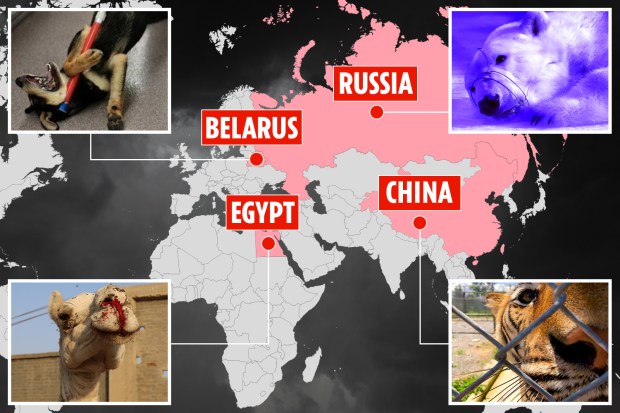In an interconnected world that boasts technological marvels and shared cultures, it is disheartening to confront a brutal reality: animal cruelty remains a widespread epidemic, poisoning the heart of various nations. While some countries are lauded for their compassion towards creatures great and small, there exists a stark juxtaposition where horrific acts against animals take place, often sanctioned or ignored. As we unravel the grim tapestry of animal suffering globally, we delve into the darkest corners, revealing which countries are the harshest towards the most innocent among us.
To truly grasp the severity of animal cruelty across the globe, one must first understand the myriad of forms it manifests. From systemic neglect to malicious acts of violence, the spectrum of cruelty extends as far as one’s imagination can fathom. Although the malicious outcomes occur worldwide, certain countries exhibit alarmingly pervasive patterns of abuse. These regions stand out not for their singular instances of inhumanity, but for a chronic indifference to animal welfare, resulting in appalling levels of suffering.
As we traverse this painful landscape, countries notorious for their mistreatment of animals emerge like dark shadows against a backdrop of civilization. Among them, China often takes the forefront. Here, cultural practices entwined with age-old traditions clash violently with the ideals of animal rights. Dogs, cats, and other beloved pets endure unspeakable horrors, particularly during events such as the Yulin Dog Meat Festival. This annual occurrence not only illustrates a deeply rooted disdain for animals but also thrusts the country into a worldwide protest, inciting rabid outcry and forcing a reconsideration of cultural norms.
Yet, the plight extends beyond China. In countries where a lack of legal frameworks provides little recourse for animals, Brazil ranks high on the list. In this sprawling nation, deforestation, exploitation, and animal trafficking run rampant, each act contributing to an appalling narrative of environmental neglect intertwined with animal suffering. The burgeoning agribusiness sector often prioritizes profit over compassion, leaving countless creatures ensnared in a cycle of abuse that is often normalized under economic necessity. The enthusiastic embrace of practices like bullfighting further showcases how societal values can perpetuate systemic cruelty.
A sobering reality emerges when we consider the plight of animals in Southeast Asia. Nations such as Thailand and Vietnam, while celebrated for their cultural vibrancy and culinary delights, harbor unspeakable abuses behind closed doors. The exotic pet trade burgeons under the shadows of bustling marketplaces, where vulnerable species languish, often succumbing to horrific conditions. Animal fights and blood sports proliferate, masking barbarity as entertainment, a grotesque spectacle that highlights the moral bankruptcy surrounding animal welfare.
Africa, rich in biodiversity and wildlife, also grapples with gruesome challenges. In countries like Zimbabwe and South Africa, trophy hunting remains a debated issue. While defenders claim it contributes to conservation efforts, critics argue it encapsulates an ethics-defying commodification of life. The scale of suffering endured by both domestic animals and wild creatures often goes unchecked, revealing a complex interlace of tradition, economic disparity, and a troubling relationship with nature.
Turning our attention to Europe, one might be surprised to find that not all nations lead with compassion. Romania has garnered a reputation for its street dog population’s relentless persecution. Abandonment and horrific treatment of these animals have led to international condemnation. The societal neglect hints at a deeper malaise—a struggle between traditional beliefs and modern sensibilities regarding animal rights. Here, the echoes of how a society treats its weakest members reverberate against the walls of morality.
Drawing back to the Americas, it is vital to acknowledge the dichotomy of animal rights within the United States. While many states boast progressive legislation aimed at animal welfare, others remain steadfast in their traditional views of hunting and animal consumption. The treatment of factory-farmed animals remains particularly harrowing, where the notion of ethical treatment often gives way to industrial efficiency, rendering countless creatures into lifeless commodities devoid of empathy.
As we traverse these chilling terrains, it becomes evident that animal cruelty is not merely a reflection of individual acts, but a barometer of societal morals and governance. The prevalence of malice often correlates with a lack of stringent animal welfare laws and educational initiatives. In many nations, where cruelty festers, ignorance reigns supreme, shrouded by economic pursuits that overshadow the sanctity of life.
So, where do we go from here? The journey towards a world where compassion reigns requires a manifold approach. Advocating for robust legislation, elevating the conversation surrounding animal rights, and fostering educational programs can serve as powerful catalysts for change. A society’s true measure can often be found not in its technological advancements, but in how it treats those who cannot speak for themselves. Together, we can shine a light on the darkest corners, press for urgent reform, and hold accountable those countries where cruelty thrives.
In conclusion, understanding which countries rank as the worst offenders in animal cruelty is not simply a matter of statistics—it is a clarion call to action. In the face of such suffering, we must strive to cultivate a global ethic of care, a commitment to transcending mere awareness and fostering a culture steeped in empathy. Only then can we unravel the deep-seated threads of cruelty and weave a new narrative—one where every creature counts, and kindness prevails.








